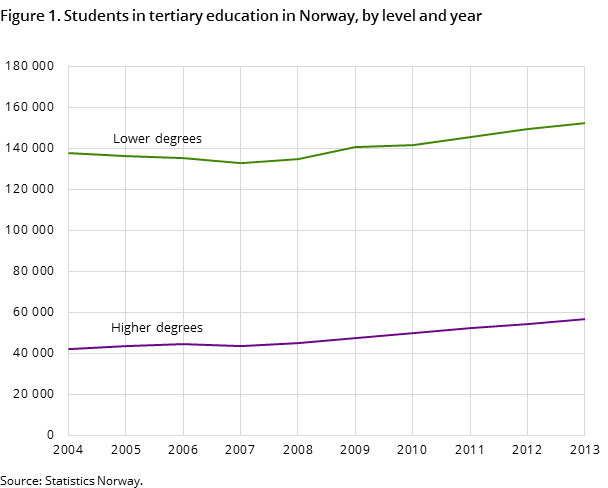Content
Published:
More students in tertiary education
The number of students in long tertiary education increased from 42 000 in 2004 to 57 000 in 2013, an increase of 35 per cent. In the same period, the number of students in short tertiary education increased from 137 500 to 152 500, an increase of 11 per cent.
| 2011 | 2012 | 2013 | |
|---|---|---|---|
| Input | |||
| Own production (NOK million) | 29 790 | 31 078 | 32 687 |
| Contracted man-years adjusted for long term leaves | 31 026 | 30 904 | 31 673 |
| Activities and services | |||
| Students, long tertiary education | 145 341 | 149 138 | 152 397 |
| Students, short tertiary education | 52 296 | 54 416 | 56 777 |
| Unit costs and productivity | |||
| Own production per 60 credit point unit (NOK) | 142 980 | 146 793 | 151 271 |
| Own production per publication point (NOK) | 802 237 | 784 988 | 839 525 |
| Related indicators | |||
| Primary applicants per student place | 2.2 | 2.3 | 2.3 |
| Population 16 years and older with a tertiary education (per cent) | 29.1 | 29.8 | 30.4 |
| Outcomes | |||
| Publication points | 13 725 | 14 577 | 14 280 |
| 2010 / 2011 | 2011 / 2012 | 2012 / 2013 | |
| Outcomes | |||
| Tertiary qualifications (lasting four years or less), completed in normal study | 63.7 | 66.7 | 65.5 |
| Tertiary qualifications (lasting longer than 4 years), completed in normal study | 58.0 | 63.0 | 58.5 |

In total, almost 211 000 students were registered at state-owned Norwegian tertiary institutions in 2013; about 5 700 more than in 2012.
A total of 31 600 tertiary degrees were completed in these institutions during the academic year 2012/13. A total of 21 300 were lower degrees completed at the undergraduate level and 10 300 were higher degrees completed at the postgraduate level. Sixty-six per cent of students who completed a lower degree completed during the normal study duration. The corresponding figure for higher degrees was 59 per cent.
More than 30 per cent of the population in the age group 16 years and older have attained a tertiary education in Norway. The highest proportion with this level of education is among the age group 30-39 years, with more than 46 per cent.
More 60-credit-points-units were produced
During the academic year 2012/13, a total production of 144 500 full-time study units were completed. Each study unit equals 60 credit points. This was 4 400 more units than the year before, or an increase of 3.1 per cent.
The operating expenditures per 60 credit points for all tertiary institutions was almost NOK 151 000 in 2013, but expenses vary from institution to institution. The Sami University College continued to have the highest operating expenditure at nearly NOK 800 000 per unit. The lowest expenditure was found at the Lillehammer University College, with NOK 90 000. As subjects offered vary from institution to institution, figures are not always directly comparable.
Expenditure increased in compensation of employees and in the use of goods and services
The expenditure for compensation of employees and for the use of goods and services – operating expenditures – was NOK 32.7 billion in 2013. This was an increase of 5.2 per cent from the year before. Comparing the different tertiary institutions, the Oslo School of Architecture and Design had the largest increase, with 11.6 per cent. Conversely, Molde University College saw a reduction in operating expenditures by 3.8 per cent. Over the last five years, the Norwegian Police University College has had a total increase of 64 per cent, followed by Gjøvik University College with 40 per cent.
20 per cent increase in contracted man-years since 2004
From 2004 to 2013, there was an increase of 20.5 per cent in the number of contracted man-years in public tertiary institutions, adjusted for long-term leave – or approximately 5 400 more man-years. The largest increase during this period was at the Norwegian Police University College, with as much as 198 per cent – or slightly less than 300 contracted man-years. From 2012 to 2013, there was an overall increase for all tertiary institutions by 2.5 per cent, or 800 man-years.
Tough entry requirements at the Norwegian School of Veterinary Science
Just under 111 000 primary applicants applied for almost 49 000 student places in 2013, i.e. 2.3 applicants per student place. The highest number of primary applicants per student place was at the Norwegian School of Veterinary Science, with as much as 9.6, followed by the Oslo School of Architecture and Design with 8.4 – a small decrease from the year before in both schools. The lowest number of primary applicants per student place was at the Sami University College, with only 0.5 primary applicants per student place.
Find more figures
Find time series for data on activities, input and outcomes in universities and colleges
Contact
-
Statistics Norway's Information Centre
E-mail: informasjon@ssb.no
tel.: (+47) 21 09 46 42
